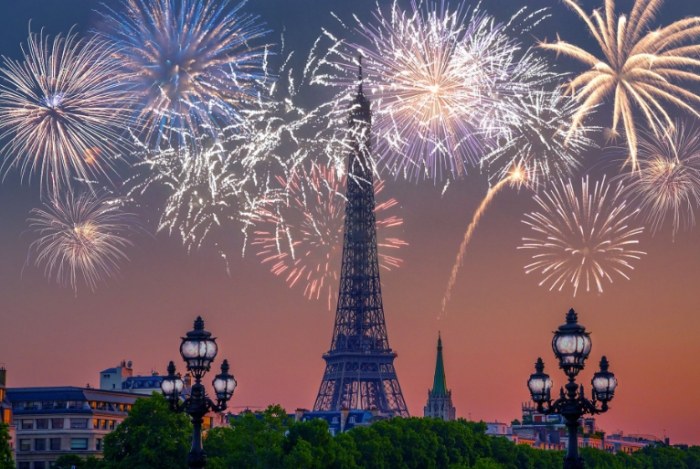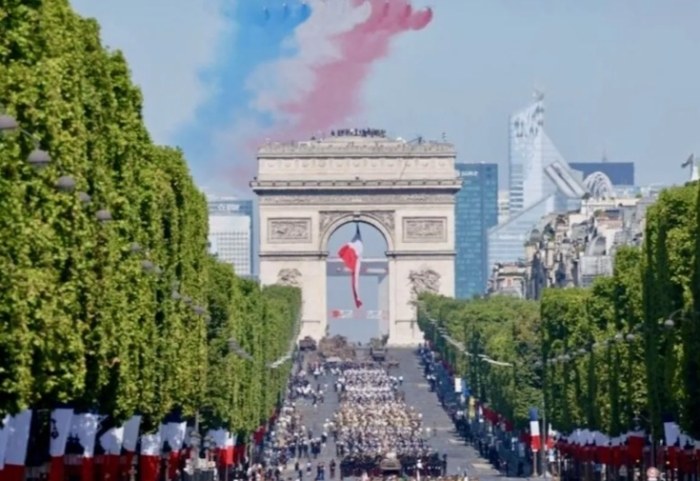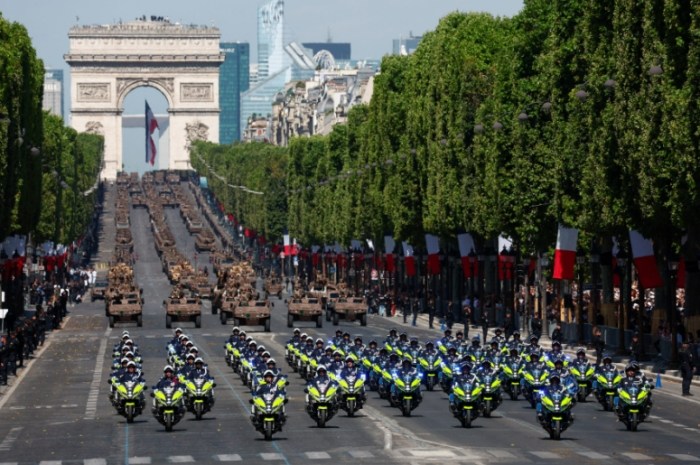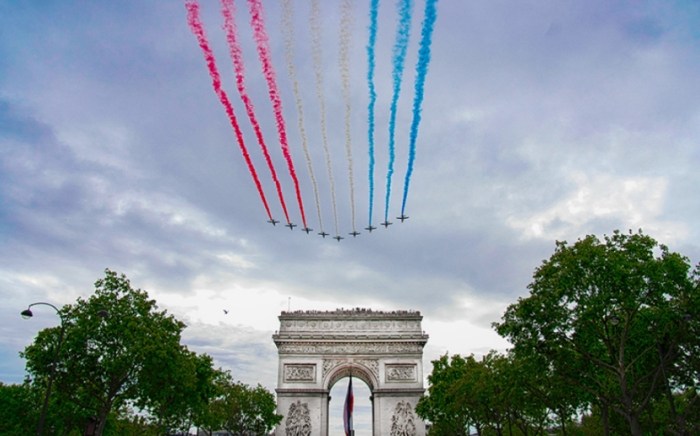Bastille Day Guide: History, Celebrations & Best Events in Paris
What is Bastille Day? Celebrated every July 14th, Bastille Day marks France's National Day with spectacular fireworks over the Eiffel Tower, military parades on the Champs-Élysées, and vibrant street parties. Discover the history of the 1789 French Revolution and how Parisians celebrate this iconic holiday in 2025!
目录
Introduction to Bastille Day
Definition and Significance

Bastille Day, officially known as La Fête Nationale in France, is a national holiday celebrated annually on July 14th. It commemorates the storming of the Bastille prison in 1789, a pivotal event that marked the beginning of the French Revolution. The Bastille, a symbol of royal tyranny and oppression, was stormed by an angry mob, which was a significant act of defiance against the monarchy and a turning - point in the struggle for liberty, equality, and fraternity.
This day is not just a historical remembrance but also a celebration of French national identity, unity, and the values that the revolution stood for. It is a time when the French people come together to honor their past, reflect on their present, and look forward to their future.
Historical Context

Pre - Revolutionary France
In the 18th century, France was an absolute monarchy ruled by King Louis XVI. The country was facing severe economic problems, including high taxes, food shortages, and a growing national debt. The social structure was highly unequal, with the clergy and nobility enjoying special privileges while the common people, or the Third Estate, bore the brunt of the tax burden.
The Storming of the Bastille
On July 14, 1789, a crowd of Parisians, fueled by anger and frustration, marched towards the Bastille. The prison was seen as a symbol of the king's arbitrary power and a place where political prisoners were held without trial. The mob successfully stormed the Bastille, capturing weapons and releasing the prisoners. This event sent shockwaves throughout France and the world, signaling the start of a revolution that would change the course of history.
Traditional Customs of Bastille Day

Military Parades
The Grande Parade in Paris
One of the most iconic traditions of Bastille Day is the military parade held in Paris. The parade takes place along the Champs - Élysées, one of the most famous avenues in the world. It is a grand display of France's military might, with soldiers from all branches of the armed forces marching in formation, accompanied by tanks, armored vehicles, and aircraft.
The parade also includes representatives from various French regions and overseas territories, showcasing the diversity and unity of the nation. The President of France, along with other high - ranking government officials, attends the parade, and it is broadcast live on national television.
Regional Parades
In addition to the parade in Paris, many other cities and towns across France hold their own military parades. These parades are often smaller in scale but still feature local military units, veterans, and civic organizations. They provide an opportunity for local communities to come together and celebrate their national pride.
Fireworks Displays
Central Paris Fireworks
Fireworks are an integral part of Bastille Day celebrations. In Paris, the main fireworks display takes place at the Eiffel Tower. Thousands of people gather in the Champ de Mars, a large public park located at the foot of the tower, to watch the spectacular show. The fireworks are synchronized with music, creating a mesmerizing experience that lights up the night sky.
Other Fireworks Events
Fireworks displays are also held in cities and towns throughout France. These events vary in size and complexity, but they all share the common goal of celebrating the national holiday. Some smaller towns may have more intimate fireworks shows, while larger cities may put on elaborate displays that attract visitors from far and wide.
Balls and Parties
Traditional French Balls
Bastille Day is also a time for socializing and celebration. Traditional French balls are held in many cities, where people dress up in formal attire and dance the night away. These balls often feature live music, traditional French cuisine, and a festive atmosphere.
Street Parties
In addition to formal balls, street parties are a common sight on Bastille Day. Neighborhoods come alive with music, food stalls, and games. People of all ages gather to enjoy the festivities, creating a sense of community and camaraderie.
Celebration Activities Across France

Activities in Paris
Visiting Historical Sites
Paris is home to many historical sites related to the French Revolution. On Bastille Day, visitors can explore places like the Place de la Bastille, where the prison once stood, and the Musée Carnavalet, which houses artifacts and exhibits about the revolution. These sites offer a glimpse into the past and help people understand the significance of the holiday.
Cultural Events
Paris also hosts a variety of cultural events on Bastille Day. There are concerts, theater performances, and art exhibitions that showcase French culture and history. The city's museums and galleries often offer special programs and discounts for visitors on this day.
Activities in Provincial France
Local Festivals
In provincial France, Bastille Day is celebrated with local festivals that reflect the unique culture and traditions of each region. For example, in some areas, there may be traditional folk dances, music performances, and food fairs. These festivals provide an opportunity for people to celebrate their local heritage while also participating in the national holiday.
Sports Events
Sports events are also a popular way to celebrate Bastille Day in provincial France. There may be cycling races, running events, and other athletic competitions. These events not only promote physical fitness but also bring the community together in a spirit of friendly competition.
Modern Evolution of Bastille Day
Inclusion of Diversity
In recent years, Bastille Day has evolved to become more inclusive of France's diverse population. The military parade now includes representatives from different ethnic and cultural backgrounds, reflecting the multicultural nature of modern France. The celebrations also emphasize the values of tolerance, equality, and respect for all citizens.
Integration of Technology
Technology has also played a role in the modern evolution of Bastille Day. Social media platforms are used to share photos, videos, and stories about the celebrations. Virtual events and online streaming have made it possible for people around the world to participate in the festivities, even if they are unable to travel to France.
Commercialization
Like many other national holidays, Bastille Day has also become somewhat commercialized. Retailers offer special sales and promotions, and there is an increase in the production of Bastille Day - themed merchandise. However, many French people still strive to maintain the true spirit of the holiday, focusing on its historical and cultural significance rather than just commercial aspects.
Classic Flow of Bastille Day Celebrations
Morning: Military Parade
The day typically begins with the military parade in Paris. The parade starts early in the morning, with soldiers and military vehicles assembling along the Champs - Élysées. Spectators line the streets, waving French flags and cheering as the parade passes by. The President of France gives a speech at the end of the parade, highlighting the importance of the holiday and the values of the nation.
Afternoon: Cultural and Recreational Activities
In the afternoon, people engage in a variety of cultural and recreational activities. In Paris, visitors can explore the historical sites and museums mentioned earlier. In other parts of the country, local festivals and sports events take place. Families and friends often gather for picnics in parks or along the riverbanks, enjoying the warm summer weather.
Evening: Fireworks and Parties
As the sun sets, the fireworks displays begin. In Paris, the Eiffel Tower lights up with a spectacular fireworks show, while in other cities and towns, local fireworks displays light up the night sky. After the fireworks, people head to balls, parties, and street celebrations, dancing and socializing until the early hours of the morning.
Important Notes and Considerations for Bastille Day
Safety Precautions
Given the large crowds and the use of fireworks, safety is a top priority during Bastille Day celebrations. Police and security forces are deployed throughout the country to ensure public safety. It is important for people to follow the instructions of authorities, stay away from restricted areas, and be mindful of their surroundings.
Respect for Cultural Traditions
While Bastille Day is a time for celebration, it is also important to respect the cultural traditions and significance of the holiday. People should avoid inappropriate behavior or actions that may disrespect the memory of the revolution and the values it represents.
Transportation and Logistics
Due to the large number of people attending the celebrations, transportation can be challenging on Bastille Day. Public transportation services may be more crowded than usual, and some roads may be closed for the military parade and other events. It is advisable to plan ahead, check transportation schedules, and consider alternative modes of transportation if necessary.
Q&A
1. Why do we celebrate the Bastille day?
We celebrate Bastille Day to commemorate the storming of the Bastille prison in 1789, which was a key event in the French Revolution. This act of defiance against the monarchy marked the beginning of a struggle for liberty, equality, and fraternity. It is a way for the French people to honor their past, remember the sacrifices made during the revolution, and reaffirm their commitment to the values that the revolution stood for.
2. What do French people say on Bastille Day?
French people often greet each other with "Bonne Fête Nationale!" which means "Happy National Holiday!" They may also use phrases like "Vive la France!" (Long live France!) to express their national pride and enthusiasm for the occasion.
3. What happens on Bastille Day in Paris?
In Paris, Bastille Day is marked by a grand military parade along the Champs - Élysées, followed by a spectacular fireworks display at the Eiffel Tower. There are also cultural events, visits to historical sites, and street parties throughout the city. The President of France attends the parade and gives a speech, and the city comes alive with a festive atmosphere.
4. Why is Bastille Day a symbol of French national pride?
Bastille Day is a symbol of French national pride because it represents the country's long - standing struggle for freedom and democracy. The storming of the Bastille was a bold act of rebellion against tyranny, and it set in motion a series of events that led to the establishment of a republic in France. The holiday celebrates the values of liberty, equality, and fraternity, which are deeply ingrained in the French national identity. It is a time when the French people come together to celebrate their shared history, culture, and achievements.